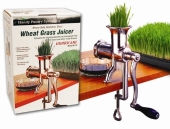




 1
1




Moderator, Treatment Free Beekeepers group on Facebook.
https://www.facebook.com/groups/treatmentfreebeekeepers/













Those who hammer their swords into plows will plow for those who don't!
 1
1




 2
2














Steven Feil wrote:If minerals are destroyed by heat then so are many, if not most vitamins. I know for sure that vitamin c is destroyed by heat.




Steven Feil wrote:
FACT: cooking DOES destroy some of the nutritional value of food. So the choice is this:
If you want immediate consumption the cold process is better.
If you want to make preserves then either one will work just fine.
I still think the cold processor would be the best choice since you still have to do the hot canning process to bottle it. Why cook it twice and waste all of that energy in the process?




 1
1




Sometimes the answer is nothing





Living a life that requires no vacation.





|
A new kitten. What are we gonna name it? How about tiny ad?
Learn Permaculture through a little hard work
https://wheaton-labs.com/bootcamp
|







